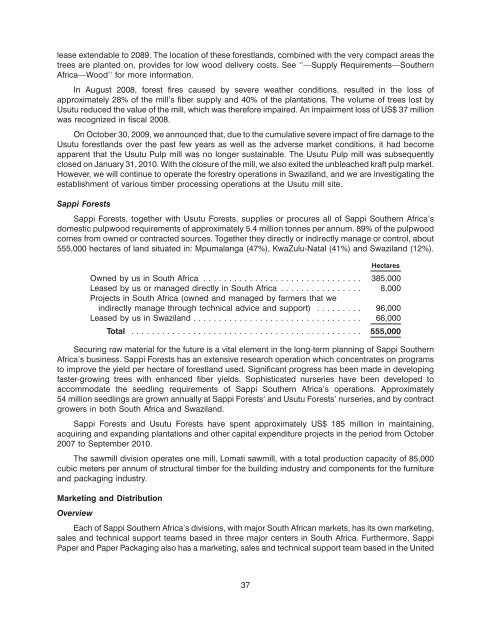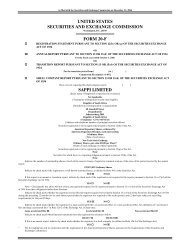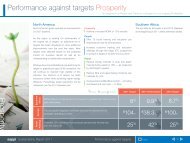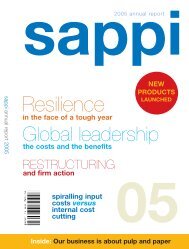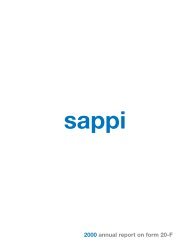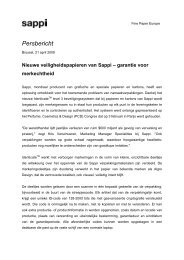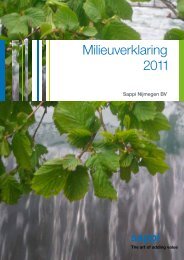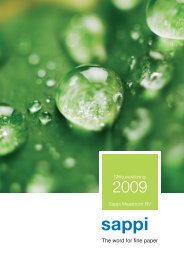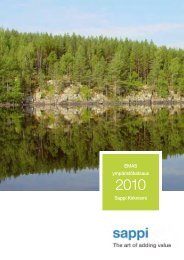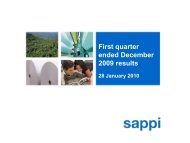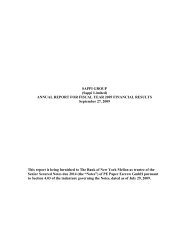You also want an ePaper? Increase the reach of your titles
YUMPU automatically turns print PDFs into web optimized ePapers that Google loves.
lease extendable to 2089. The location of these forestlands, combined with the very compact areas the<br />
trees are planted on, provides for low wood delivery costs. See ‘‘—Supply Requirements—Southern<br />
Africa—Wood’’ for more information.<br />
In August 2008, forest fires caused by severe weather conditions, resulted in the loss of<br />
approximately 28% of the mill’s fiber supply and 40% of the plantations. The volume of trees lost by<br />
Usutu reduced the value of the mill, which was therefore impaired. An impairment loss of US$ 37 million<br />
was recognized in fiscal 2008.<br />
On October 30, 2009, we announced that, due to the cumulative severe impact of fire damage to the<br />
Usutu forestlands over the past few years as well as the adverse market conditions, it had become<br />
apparent that the Usutu Pulp mill was no longer sustainable. The Usutu Pulp mill was subsequently<br />
closed on January 31, 2010. With the closure of the mill, we also exited the unbleached kraft pulp market.<br />
However, we will continue to operate the forestry operations in Swaziland, and we are investigating the<br />
establishment of various timber processing operations at the Usutu mill site.<br />
Sappi Forests<br />
Sappi Forests, together with Usutu Forests, supplies or procures all of Sappi Southern Africa’s<br />
domestic pulpwood requirements of approximately 5.4 million tonnes per annum. 89% of the pulpwood<br />
comes from owned or contracted sources. Together they directly or indirectly manage or control, about<br />
555,000 hectares of land situated in: Mpumalanga (47%), KwaZulu-Natal (41%) and Swaziland (12%).<br />
Owned by us in South Africa ...............................<br />
Hectares<br />
385,000<br />
Leased by us or managed directly in South Africa ................<br />
Projects in South Africa (owned and managed by farmers that we<br />
8,000<br />
indirectly manage through technical advice and support) ......... 96,000<br />
Leased by us in Swaziland ................................. 66,000<br />
Total ............................................. 555,000<br />
Securing raw material for the future is a vital element in the long-term planning of Sappi Southern<br />
Africa’s business. Sappi Forests has an extensive research operation which concentrates on programs<br />
to improve the yield per hectare of forestland used. Significant progress has been made in developing<br />
faster-growing trees with enhanced fiber yields. Sophisticated nurseries have been developed to<br />
accommodate the seedling requirements of Sappi Southern Africa’s operations. Approximately<br />
54 million seedlings are grown annually at Sappi Forests’ and Usutu Forests’ nurseries, and by contract<br />
growers in both South Africa and Swaziland.<br />
Sappi Forests and Usutu Forests have spent approximately US$ 185 million in maintaining,<br />
acquiring and expanding plantations and other capital expenditure projects in the period from October<br />
2007 to September 2010.<br />
The sawmill division operates one mill, Lomati sawmill, with a total production capacity of 85,000<br />
cubic meters per annum of structural timber for the building industry and components for the furniture<br />
and packaging industry.<br />
Marketing and Distribution<br />
Overview<br />
Each of Sappi Southern Africa’s divisions, with major South African markets, has its own marketing,<br />
sales and technical support teams based in three major centers in South Africa. Furthermore, Sappi<br />
Paper and Paper Packaging also has a marketing, sales and technical support team based in the United<br />
37


